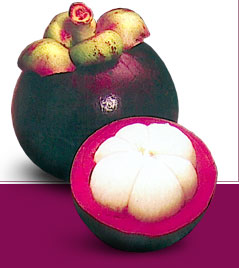
Inhibition of cyclooxygenase and
prostaglandin E2 synthesis by gamma-mangostin, a xanthone derivative in
mangosteen, in C6 rat glioma cells.
Nakatani K,
Nakahata N,
Arakawa T,
Yasuda H,
Ohizumi Y.
Department of Pharmaceutical Molecular Biology, Graduate School of
Pharmaceutical Sciences, Tohoku University, Aoba, Aramaki, Aoba-ku, 980-8578,
Sendai, Japan.
The fruit hull of mangosteen, Garcinia
mangostana L., has been used for many years as a medicine for treatment of skin
infection, wounds, and diarrhea in Southeast Asia. In the present study, we
examined the effect of gamma-mangostin, a tetraoxygenated diprenylated xanthone
contained in mangosteen, on arachidonic acid (AA) cascade in C6 rat glioma
cells. gamma-Mangostin had a potent inhibitory activity of prostaglandin E2
(PGE2) release induced by A23187, a Ca2+ ionophore. The inhibition was
concentration-dependent, with the IC50 value of about 5 microM. gamma-Mangostin
had no inhibitory effect on A23187-induced phosphorylation of p42/p44
extracellular signal regulated kinase/mitogen-activated protein kinase or on the
liberation of [14C]-AA from the cells labeled with [14C]-AA. However, gamma-mangostin
concentration-dependently inhibited the conversion of AA to PGE2 in microsomal
preparations, showing its possible inhibition of cyclooxygenase (COX). In enzyme
assay in vitro, gamma-mangostin inhibited the activities of both constitutive
COX (COX-1) and inducible COX (COX-2) in a concentration-dependent manner, with
the IC50 values of about 0.8 and 2 microM, respectively. Lineweaver-Burk plot
analysis indicated that gamma-mangostin competitively inhibited the activities
of both COX-1 and -2. This study is a first demonstration that gamma-mangostin,
a xanthone derivative, directly inhibits COX activity.
